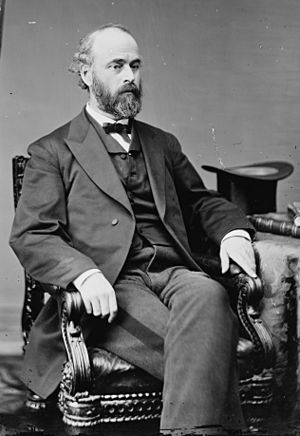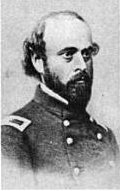Orris S. Ferry facts for kids
Quick facts for kids
Orris Sanford Ferry
|
|
|---|---|
 |
|
| United States Senator from Connecticut |
|
| In office March 4, 1867 – November 21, 1875 |
|
| Preceded by | Lafayette S. Foster |
| Succeeded by | James E. English |
| Member of the U.S. House of Representatives from Connecticut's 4th district |
|
| In office March 4, 1859 – March 4, 1861 |
|
| Preceded by | William D. Bishop |
| Succeeded by | George C. Woodruff |
| Member of the Connecticut Senate from the 12th district |
|
| In office 1855–1857 |
|
| Preceded by | William T. Minor |
| Succeeded by | James H. Hoyt |
| Personal details | |
| Born | August 15, 1823 Bethel, Connecticut |
| Died | November 21, 1875 (aged 52) Norwalk, Connecticut |
| Resting place | Union Cemetery Norwalk, Connecticut |
| Political party | Republican, Liberal Republican |
| Spouse | Charlotte Bissell |
| Alma mater | Yale College |
| Profession | Politician, Lawyer, Judge |
| Signature | |
| Military service | |
| Branch/service | United States Army Union Army |
| Rank | |
| Unit | 5th Connecticut Infantry Regiment |
| Battles/wars | American Civil War |
Orris Sanford Ferry (born August 15, 1823 – died November 21, 1875) was an American lawyer and politician from Connecticut. He was a member of the Republican Party. Ferry served in both the United States House of Representatives and the United States Senate. He also held the rank of brigadier general in the Union Army during the American Civil War.
Contents
Early Life and Education
Orris Sanford Ferry was born on August 15, 1823, in Bethel, Connecticut. As a boy, he worked in his father's shoe factory. It was there that he discovered his love for books.
At age 17, Ferry began studying at Yale College. He graduated from Yale in 1844. After college, he studied law under Thomas B. Osborne in Fairfield, Connecticut. He then moved to Norwalk, Connecticut, and continued his law studies.
In 1846, Ferry became a lawyer. The next year, he was made a lieutenant colonel in the local militia. This was a military group, but Ferry did not fight in any battles during this time. He married Charlotte Bissell, whose father was Governor Clark Bissell.
Starting a Political Career
After becoming a lawyer, Orris Ferry served as a probate judge. A probate judge handles legal matters like wills and estates. When he was 32, he was elected to the Connecticut Senate. He represented the 12th District.
From 1856 to 1859, Ferry worked as the State's Attorney for Fairfield County. This role is like a prosecutor, representing the state in legal cases. Ferry was first part of the Toleration Party. However, in 1856, he joined the Republican Party. He then helped campaign for John C. Frémont, who was running for president.
In 1857, Ferry tried to get elected to the United States House of Representatives but did not win. He ran again in 1859 and won that election.
Serving in Congress
While in the House of Representatives, Orris Ferry was known for his speeches. He often spoke without notes. He gave many speeches against slavery.
Ferry was chosen to represent Connecticut on a special group called the Committee of Thirty-Three. This committee was formed to try and find a peaceful solution between the Northern and Southern states. However, more Southern states left the Union, and the committee was eventually stopped. Ferry also served on the Committee of Revolutionary Claims. In 1861, he lost his bid for reelection.
American Civil War Service
When the American Civil War began, there was a rumor about a plan to attack Washington. On April 18, 1861, many loyal citizens, including Ferry, formed a local militia. This group was led by Cassius Marcellus Clay.
On July 23, 1861, Orris Ferry was given command of the 5th Connecticut Volunteer Infantry. He was given the rank of colonel. In March 1862, Ferry led his troops across the Potomac River. They attacked Confederate forces near Winchester, Virginia. This action led to the First Battle of Winchester. Ferry was praised for his leadership skills.
Ferry was promoted to brigadier general on March 17, 1862. He then served under General James Shields. Their division joined with General Irvin McDowell's forces. Ferry fought at the First Battle of Winchester under McDowell. He continued to serve under General Shields during the Valley Campaign.
Battle of Cedar Mountain
After the First Battle of Winchester, Ferry and his troops were placed under the command of Major General Nathaniel Banks. On August 9, General Banks's forces, including Ferry's, met Stonewall Jackson's Confederate army at the Battle of Cedar Mountain.
The Union troops attacked first, gaining an early advantage. However, the Confederates fought back strongly. They pushed back Banks's army and won the battle that day. Later, Union reinforcements arrived, leading to a two-day standoff. The battle ended as a Confederate victory.
End of Military Service
During the war, Ferry served in several different army groups, known as corps. He also led military districts, including the District of Lehigh and the District of Philadelphia.
Ferry was given the honorary rank of major general for his service during the Peninsula Campaign. He left the military on July 15, 1865. This was after the Confederate army surrendered, marking the end of the Civil War.
Senate Career
After the Civil War, Orris Ferry returned to his law practice and political career. In 1866, he ran for a seat in the United States Senate. He won the election against Lafayette S. Foster. Ferry began his term in the U.S. Senate on March 4, 1867.
He became very active in Senate committees. He believed in giving amnesty, or forgiveness, to former members of the Confederacy. Ferry also took part in the process to impeach President Andrew Johnson. He voted to remove the president from office.
In 1869, Ferry became ill with a rare spine disease. This illness slowly made his spine worse. It made his work in the Senate harder, but he continued to be active. From 1870 to 1871, he led the Committee to Audit and Control the Contingent Expenses. From 1871 to 1875, he was the chairman of the Committee on Patents. Ferry also served on the Committee on Health, Education, Labor, and Pensions.
Ferry was considered a Liberal Republican. However, he chose not to officially join that new party. In 1872, he was reelected for a second term in the Senate. His main supporters were Democrats and Liberal Republicans.
Later Senate Work
In 1874, Ferry gave a speech against a bill that would later become the Civil Rights Act of 1875. After his speech, Senator Charles Sumner, who was a friend of Ferry's and had proposed the bill, told him that his speech was the most damaging blow the bill had received.
The Civil Rights Act did eventually pass. However, the Supreme Court later ruled it unconstitutional. They said that Congress did not have the power to control the actions of individuals in this way. Orris Ferry's last speech in Congress was a tribute to his friend, William Alfred Buckingham.
Death
After his final speech, Orris Ferry left Washington D.C. to seek new medical treatment. The treatment was meant to help his decaying spine, but it did not work. On November 20, 1875, his friends and doctors helped him return home. He died from his spine disease the next day, November 21, 1875. His funeral was attended by many important people. Ferry was buried at Union Cemetery in Norwalk, Connecticut.
Images for kids



